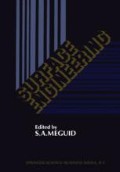Abstract
The effects of microstructure and strain amplitude on low cycle fatigue lives and fracture characteristics of Inconel 718 were studied. All the tests were conducted in air at 650°C Results show that the conventional microstructure had only marginally longer fatigue lives than the damage tolerant microstructure irrespective of the applied strain amplitude. The fracture surface and fracture profile observations demonstrate that the resistance to intergranular cracking was improved by the serrated grain boundaries in the damage tolerant microstructure but the concomitant precipitation of large δ along serrated grain boundaries promoted the formation of microvoids and decohesion at the δ plate-matrix interfaces during cyclic straining. The impact of the two microstructures on LCF crack initiation life is also discussed.
Access this chapter
Tax calculation will be finalised at checkout
Purchases are for personal use only
Preview
Unable to display preview. Download preview PDF.
References
Barker, J.D., Krueger, D.D. and Chang, D.R, Thermomechanical processing of Inconel 718 and effect on properties. Proc. of the Nicholas Grant Symposium. June 1985, pp. 125–137.
Oblak, J.M., Paulonis, D.F. and Duvall, D.S., Coherency strengthening in Ni-base alloys hardened by DO22 γ′ precipitates. Met. Trans., 1974, 5, pp. 143–153.
Hall, R.C., The Metallurgy of Alloy 718. J. Basic Engineering. Sept. 1967, pp. 511–516.
Thamburaj, R., Terada, T., Koul, A.K., Wallace, W. and M.C. de Malherbe, The influence of microstructure and environment upon elevated temperature crack growth rates in Inconel 718, Proc. Conf. on ‘High Temperature Creep,’ Tokyo, Japan, ASME/JSME, 1986, pp. 275–287.
Koul, A.K., Au, P., Bellinger, N., Thamburaj, R., Wallace, W., and Immarigeon, J-P. Development of a damage tolerant microstructure for Inconel 718 turbine disc material, Superalloys 88 book, Ed., S. Reichman et al., Met. Soc. of AIME, 1988, pp. 3–12.
Au, P., Development of an isothermal low cycle fatigue testing facility. NRCC, NAE LTR-ST-1601, September 1986.
Mills, W.J. and James, L.A., Effect of heat-treatment upon the fatigue- crack growth behaviour of Alloy 718 weldments — part II: Microscopic behaviour. J. Eng. Mater. Technol., 1985, 107, pp. 41–47.
Fournier, D. and Pineau, A., Low cycle fatigue behaviour of Inconel 718 at 198K and 823K. Met. Trans., 1977. 8A. pp. 1095–1105.
Sanders, T.H., Frishmuth, R.E. and Embley, G.T., Temperature dependent deformation mechanisms of Alloy 718 in low cycle fatigue. Met. Trans., 1981, 12A, pp. 1003–1010.
James, L.A., The effect of grain size upon the fatigue-crack propagation behaviour of Alloy 718 under hold-time cycling at elevated temperature. Engineering Fracture Mechanics. 1986. 25, pp. 305–314.
Krueger, D.D., Antolovich, S.D. and Van Stone, R.H., Effect of grain size and precipitate size on the fatigue crack growth behaviour of Alloy 718 at 427°C. Met. Trans. 1987, 18A, pp. 1431–1449.
Pédron, J.P. and Pineau, A., The effect of microstructure and environment on the crack growth behaviour of Inconel 718 alloy at 650°C under fatigue, creep and combined loading. Mat. Sci. Eng., 1982, 56, pp. 143–156.
Lerch, B.A., Jayaraman, N. and Antolovich, S.D., A study of fatigue damage mechanisms in Waspaloy from 25 to 800°C, Mat. Sci and Eng., 1984, 66, pp. 151–166.
Fournier, D. and Pineau, A., Low cycle fatigue behaviour of Inconel 718 at 298K and 823K, Met Trans. 1977, 8A, pp. 1977–1095.
Rao, K.B.S., Schiffers, H., Schuster, S. and Nickel, H., Influrence of time and temperature dependent processes on strain controlled LCF behaviour of Alloy 617, Metall. Trans., 1988. 19A, pp. 359–371.
Hwang, S.K., Lee, H.N. and Yoon, B.H., Mechanism of cyclic softening and fracture of a Ni-base γ′ strengthened alloy under LCF, Metall. Trans., 1989, 20A, pp. 1793–2801.
Author information
Authors and Affiliations
Editor information
Editors and Affiliations
Rights and permissions
Copyright information
© 1990 Springer Science+Business Media Dordrecht
About this chapter
Cite this chapter
Bande, H., Xiao, Y., Au, P., Koul, A.K., Wallace, W. (1990). Low Cycle Fatigue Fracture Behaviour of Conventional and Damage Tolerant Microstructures of Inconel 718 at 650°C. In: Meguid, S.A. (eds) Surface Engineering. Springer, Dordrecht. https://doi.org/10.1007/978-94-009-0773-7_25
Download citation
DOI: https://doi.org/10.1007/978-94-009-0773-7_25
Publisher Name: Springer, Dordrecht
Print ISBN: 978-94-010-6834-5
Online ISBN: 978-94-009-0773-7
eBook Packages: Springer Book Archive

